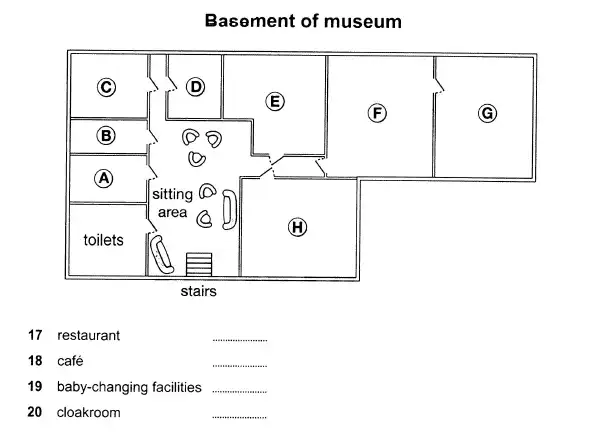Part 1: Questions 1-7
Complete the table below. Write ONE WORD AND/OR A NUMBER.
| Event | Cost | Venue | Notes |
|---|---|---|---|
| Jazz band | tickets available for £ 15 | the (1)…………….school | also appearing: Carolyn Hart (plays the (2)……………..) |
| Duck races | £ 1 per duck | start behind the (3)……………… | – prize: tickets for (4)……………..held at the end of the festival \ – ducks can be bought in (5)…………….. |
| Flower show | free | (6)……………….Hall | prizes presented at 5 pm by a well known (7)………………. |
(1) (2)
(3) (4)
(5) (6)
(7)
Questions 8-10
Who is each play suitable for?
Write the correct letter A, B or C.
A mainly for children
B mainly for adults
C suitable for people of all ages
Plays
8. The Mystery of Muldoon
9. Fire and Flood
10. Silly Sailor
Part 2: Questions 11-16
What does the speaker say about each of the following collections?
Choose SIX answers from the box and write the correct letter A-G.
Comments
A was given by one person
B was recently publicized in the media
C includes some items given by members of the public
D includes some items given by the artists
E includes the most popular exhibits in the museum
F is the largest of its kind in the country
G has had some of its contents relocated
Collections
11. 20th-and 21st-century paintings
12. 19th-century paintings
13. Sculptures
14. ‘Around the world’ exhibition
15. Coins
16. Porcelain and glass
Questions 17-20
Label the plan below. Write the correct letter A-H, next to questions 17-20.

(17) (18)
(19) (20)
Part 3: Questions 21 and 22
Choose TWO letters A-E.
Which TWO characteristics were shared by the subjects of Joanna’s psychology study?
A They had all won prizes for their music
B They had all made music recordings
C They were all under 27 years old
D They had all toured internationally
E They all played a string instrument
Questions 23 and 24
Choose TWO letters, A-E.
Which TWO points does Joanna make about her use of telephone interviews?
A It meant rich data could be collected
B It allowed the involvement of top performers
C It led to a stressful atmosphere at times
D It meant interview times had to be limited
E It caused some technical problems
Questions 25 and 26
Choose TWO letters, A-E.
Which TWO topics did Joanna originally intend to investigate in her research?
A regulations concerning concert dress
B audience reactions to the dress of performers
C changes in performer attitudes to concert dress
D how choice of dress relates to performer roles
E links between musical instrument and dress choice
Questions 27-30
Choose the correct letter A, B or C.
27. Joanna concentrated on women performers because
A women are more influenced by fashion
B women’s dress has led to more controversy
C women’s code of dress is less strict than men’s
28. Mike Frost’s article suggests that in popular music, women’s dress is affected by
A their wish to be taken seriously
B their tendency to copy each other
C their reaction to the masculine nature of the music
29. What did Joanna’s subjects say about the audience at a performance?
A The musicians’ choice of clothing is linked to respect for the audience
B The clothing should not distract the audience from the music
C The audience should make the effort to dress appropriately
30. According to the speakers, musicians could learn from sports scientists about
A the importance of clothing for physical freedom
B the part played by clothing in improving performance
C the way clothing may protect against physical injury
Part 4: Questions 31-40
Complete the notes below. Write ONE WORD ONLY.
The use of soil to reduce carbon dioxide (CO2) in the atmosphere
Rattan Lal:
• Claims that 13% of CO2 in the atmosphere could be absorbed by agricultural soils
• Erosion is more likely in soil that is (31)
• Lai found soil in Africa that was very (32)
• It was suggested that carbon from soil was entering the atmosphere
Soil and Carbon:
• Plants turn CO2 from the air into carbon based substance such as (33)
• Some CO2 moves from the (34) of plants to microbes in soil
• Carbon was lost from the soil when agriculture was invented
Regenerative agriculture:
• uses established practices to make sure soil remains fertile and (35)
• e.g. through year-round planting and increasing the (36) of plants that are grown
California study:
• taking place on a big (37) farm
• uses compost made from waste from agriculture and (38)
Australia study:
• aims to increase soil carbon by using (39) that are always green
Future developments may include:
• reducing the amount of fertilizer used in farming
• giving farmers (40) for carbon storage, as well as their produce
WhatsApp us
